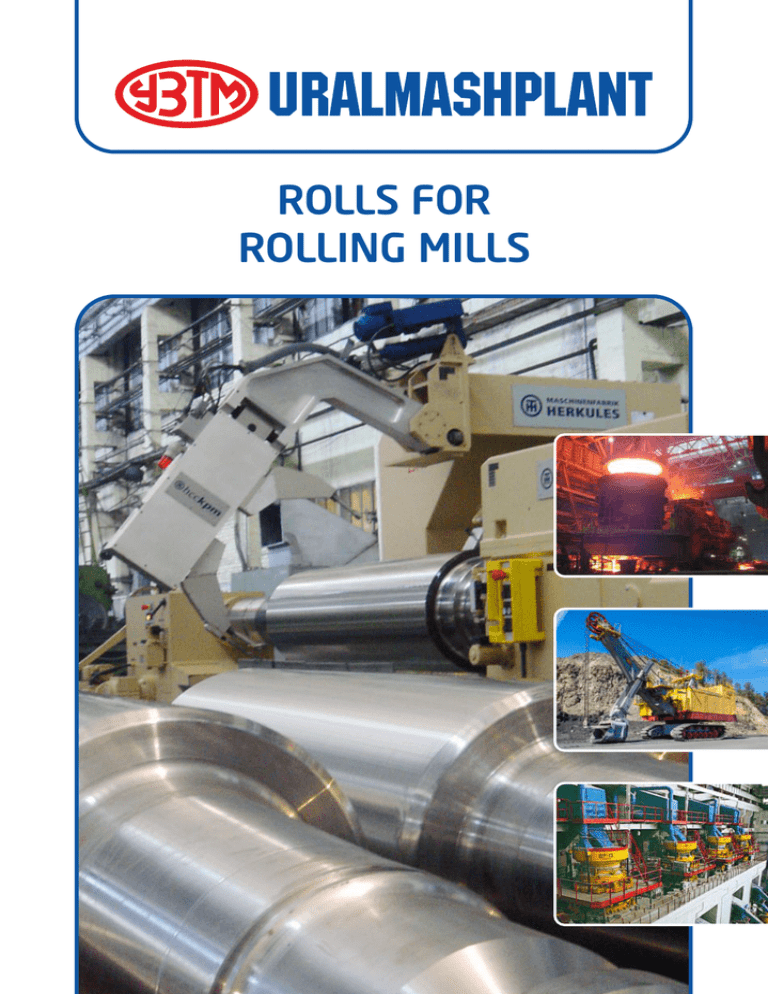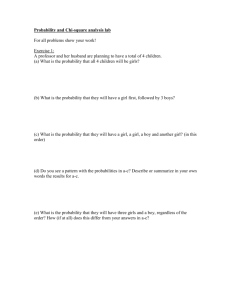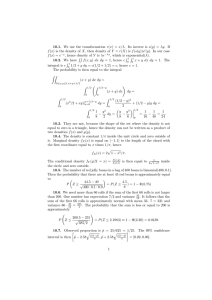ROLLS FOR ROLLING MILLS
advertisement

ROLLS FOR ROLLING MILLS The “Uralmashplant” JSC, is a key equipment supplier for basic industry sectors: mining, metallurgical, and oil-and-gas industries. In 2013 the “Uralmashplant” marked its 80s anniversary. The main shareholder of the “Uralmashplant” is the “Gazprombank” JSC, one of the three largest Russian banks. Today, the “Uralmashplant” JSC is a company providing the state-of-the-art engineering, welding, metal-working, mechanical assembly, and tool production works. Main product assortment includes: Mining equipment - walking and track-type draglines, - track-type open-mine excavators, - cone and jaw crushers for all crushing stages, - ball and rod grinding mills, semiautogenous and autogenous grinding mills, - concrete-production equipment. Metallurgical equipment - sintering equipment, - indurating equipment, - blast furnace equipment, - continuous casting machines, - rolling equipment, - press-forging equipment, - rolling mill rolls Oil-and-gas drilling equipment - complete movable, stationary, and cluster drilling rigs with loading capacity from 160 to 600 tons, - drilling equipment packages. Handling equipment - heavy cranes for metallurgical works, - handling equipment for nuclear plants, - general purpose special and bridge cranes. Power equipment and nonstandard equipment - hydraulic turbine units, - transfer and homogenizing equipment units. A company development strategy is aimed at creating a world-class machine-building company able to fully fulfill customers' needs for modern equipment. 2 History The first in the USSR rolls for hot-rolling mills were produced from ingots weighing up to 40 tons at Uralmashplant in 1934. The plant began producing large ingots, weighing 60 tons and more, in 1935-1936, which allowed to manufacture large backup rolls for rolling mills. Because of exceptionally high requirements to the quality of metal used for production of cold mill rolls, re-tooling and modernization of the production plant were carried out by the 1940. Since then, rolls for cold-rolling mills have become an integral part of Uralmashplant's assortment. Uralmashplant is rated among the leaders at the world's roll market due to renovated production capacities. Based on the manufacturing facilities, the plant has mastered production of a new type of rolls with 3 to 5 percent Cr content, as well as higher content of alloying elements, which allows to make the service life of rolls 1.5 to 2 times longer. 3 7 Rolls for Hot-rolling Mills Specifications Barrel size, mm Roll type 4 Max. Dia. Max. Length Work Rolls for Sheet Mills 1500 4500 Backup Rolls for Sheet Mills 1600 3030 Rolls for Blooming and Slabbing Mills 1700 2800 Rolls for Billet Mills 1290 2060 Rolls for Rail-andstructural Mills 1565 2850 Rolls for Section and Bar Mills 1400 2300 Vertical rolls for sheet mills 1200 900 Roll Seeves 1600 2400 Rolls for Tubular Mills 875 1000 Material Maximum barrel/ neck hardness 50 55Х 60ХН 75ХМФ 150ХНМ 60ХН 75ХМФ, 75Х2МФ 45Х5МФ, 75Х3МФ1 50 50ХН 60ХН 75ХМФ 90ХМФ 50 50ХН 60ХН 50 55Х 60ХН 75ХМФ 75ХМФА 45 50 50ХН 60ХН 150ХНМ 56NiCrMoV7 55Х 50ХН 60ХН 150ХНМ 75ХМФА 60ХН 90ХФ 5ХНМ2 150ХНМ 55Х 50ХН 187…229 НВ 223…277 НВ 229…285 НВ 38…45 HSD 321…363 НВ 207…255 НВ 65…75 / 30…55 HSD 65…71 / 30…55 HSD 187…229 НВ 223…277 НВ 240…285 НВ 229…285 НВ 35…75 HSD 187…229 НВ 223…277 НВ 255…302 НВ 187…229 НВ 223…277 НВ 229…285 НВ 277…321 НВ 35…45 HSD 143…179 НВ 187…229 НВ 223…277 НВ 269…302 НВ 380…410 НВ 45…50 HSD 223…277 НВ 235…286 НВ 229…285 НВ 300…330 НВ 42…47 HSD 265…300 НВ 55…65 HSD 50…60 HSD 360…390 НВ 255…302 НВ 233…277 НВ Rolls for Cold-rolling Mills. Specifications Barrel size, mm Roll type Max. Dia. Max. Length Material Work Rolls for Rolling, Tempering and Reversing Mills 440-500, 585-615 185-700 2500 2800 Backup rolls for rolling, tempering and reversing mills Chevron rolls 650-1600 4000 400-1100 2000 Rollers 185-440 2800 9Х2, 9Х2МФ, 8Х2СГФ, 8Х3СГФ, 65Х5МФС, Klesid unit hardening and Power Current 700М unit hardening 75ХМФ, 90ХФ 75Х2МФ, 75Х3МФА 45Х5МФ, EBR 42 and others 34ХН1М, 45ХНМ, 38Х2Н3М, 38Х2НМ, 45Х2НМФ and others 9Х1,9Х2,9Х2МФ and others Maximum barrel/ neck hardness 95…102/45…55 HSD 70…75 / 30…55 HSD 70…75 / 30…55 HSD 269…311 НВ 85…102 / 30…55 HSD Note For hardness testing, Brinell (HB), Shore (HSD, HSC), and Equotype testers (HLE, HLD, HLG) are available with Uralmashplant. After power current hardening the depth of the working surface is no less than: - Work rolls for Cold-rolling Mills of 9Х1, 9Х2, 9Х2МФ, 8Х2СГФ steel grades – 22 mm; 8Х3СГФ – 30 mm - Backup rolls for Cold-rolling Mills of 90ХФ, 75ХМФ, 75Х2МФ steel grades – 50 mm; 75Х3МФА – 55 mm; 45Х5МФ, EBR 42 – 100 mm on radius. Hardness variation along the roll barrel length is within 2-3 HSD. 5 Built-up (sleeved) backup rolls Sleeves contribute to improvement of material utilization, since the material of sleeves is mostly consumed, and the roll shafts are used more than once. With roll shafts being re-used 35 times, the coefficient of material consumption for sleeved rolls is 2-5 times as low as for solid forged rolls. A built-up (sleeved) roll consists of a steel shaft and a sleeve. The fundamental advantage of built-up rolls is that sleeves of highly durable materials can be used. Forged, and especially high-carbon cast structure, changing due to heat treatment and a large quantity of alloying element carbides, provides for high and uniform hardness and wear-resistance. Longevity of sleeved rolls is 2-3 times as high as that of solid-forged rolls. Design features The sleeve makes the working surface 2 or more times thicker Roll spindle can be used more than once Guaranteed features of built-up (sleeved) backup rolls Required uniform hardness of the sleeve Reliability of sleeve fit on the shaft No tendency towards cracking or barrel spalling No metallurgical or structural defects Minimal level of residual stress No design flaws impairing the roll performance 6 Forged steel rolls for Hot-rolling Mills Blooming, slabbing and breakdown mills, as well as roughing stands of section and structural mills require that the rolls endure high temperatures and heavy dynamic loads. Solid-forged rolls made of carbon tool steels are characterized by high hardness and wearresistance. Depending on the service conditions, heat checking resistance is provided by complex alloying using either chromium, molybdenum, or vanadium. Design features Roll ends can be made in the form of tenons, flat (fork type), cylindrical (with splines or key grooves). Guaranteed features of forged steel rolls for hot-rolling mills High wear-resistance Slight tendency towards heat checking High resistance to surface spalling, especially under conditions of high and unevenly distributed pressure on the roll barrel surface. 7 Solid-forged backup rolls for Cold- and Hot-rolling Mills Rolls are the primary tool for shaping the material, setting the roll final dimensions, surface finish and mechanical properties. Depending on the service conditions, the strength of backup rolls is achieved thanks to complex alloying using chromium, molybdenum, vanadium, etc. The roll metal quality is inspected by means of ultrasonic flaw detectors at all main manufacturing stages. Design features Carbon steels, high-carbon tool steels and alloyed steels are used to ensure high hardness and wear-resistance of rolls All backup rolls are made of vacuum degassed steel. Guaranteed features of solid-forged backup rolls for cold- and hot-rolling mills High and uniform hardness after power current hardening (within 1-2 HSD over the barrel) Effective layer depth is min. 40–100mm over the radius High strength of the roll material combined with ductility No tendency towards cracking or barrel surface spalling Absence of metallurgical and structural defects Minimal level of residual stress No design flaws impairing the roll performance 8 Forged steel work rolls for Cold-rolling Mills Work rolls for cold rolling are made of alloyed steels. The complex of heat treatment provides for the necessary mechanical properties of the hardened layer due to creating a uniform fine-grain structure. Final stabilizing heat treatment is intended to reduce and equalize the residual thermal stresses. Guaranteed features of forged steel work rolls for cold rolling High and uniform hardness after hardening (within 1-2 HSD over the barrel) Effective layer depth over the radius (20-40 mm) High thermal fatigue resistance during overall and local heat-up, increased heat resistance (high hardness is maintained for a long time under steady-state thermal conditions of the roll); Resistance to surface defects, cracking, lamination, scabbing, spalling, tearing, etc. High surface quality after heat treatment and machining Favourable distribution and minimal value of residual stresses after hardening and machining Absence of metallurgical defects and impurities Absence of flakes, coarse carbide clusters, carbide network, large-pattern acicular martensite and other macro- and microstructural defects Absence of machining defects 9 7 Quality control Quality control during the roll manufacture is carried out at every stage of the workflow. Main control operations Chemical composition of steel – by heat sampling Roll surface hardness – using the Brinell, Shore and Equotip Hardness testers; Roll material quality – visually, by means of ultrasonic and magnetic particle inspection Surface roughness – by means of comparison to the reference block, or employing the contact method using profilometer-profilograph SURFTEST Dimensional conformance – using universal and special means and methods of measuring. Packing and preservation Packing and preservation methods depend on the contract conditions and on the climatic zone where the rolls are going to be supplied, as well as on the transportation and storage conditions. The items ready to be shipped are covered with a preservative coating – several layers of primer and enamel. T h e r o l l n e c k s a r e w ra p p e d i n t o anticorrosive paper with polyethylene coating and into waterproof paper. After preservation the roll barrel and necks are covered with wooden bars or sheet rubber. The covering is fixed with a steel band, which is locked. At the customer's request, work rolls can be packed into wooden cases. Preservation is valid for 6-12 months if the rolls are stored in a covered building in their transport package. Storage and service The rolls should be stored at a non-heated storage, on special shelves, resting on their necks. Ageing or periodical low tempering is strongly recommended during roll operation life. 10 Map of Deliveries Russia France USA Spain Belarus Poland Germany Ukraina Czechia Romania Hungary Italy Bulgaria Macedonia Uralmashplant Kazakhstan Iran Morocco Algeria Pakistan Korea China Egypt India Indonesia 11 7 Pervoy Pyatiletki sqr., Ekaterinburg, Russia, 620012 Phone: +7 (343) 336-61-01, Fax: +7 (343) 336-60-40 E-mail: mail@uralmash.ru, Http://www.uralmash.ru

